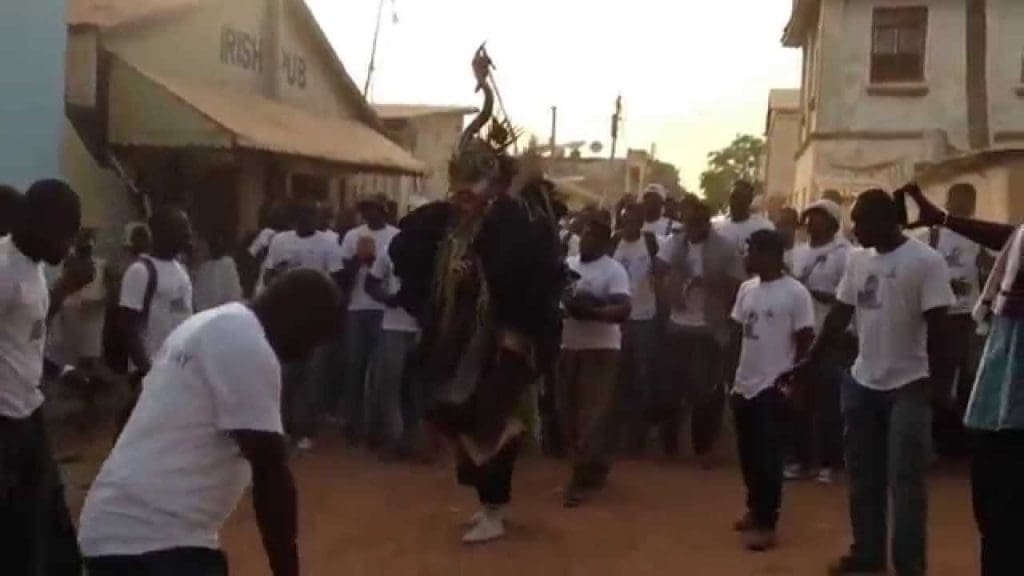In years gone by, Banjul used to enjoy a special reputation as a bustling hub for activities organised around Christmas and New Year festivities animated by fairies.
But the carnival atmosphere that used to envelop the Gambian capital from Christmas to the New Year is no more!
Today, Banjulians belonging to the older generation rue the fact that the city has lost its lustre from the spectacle of devil masks or dancing fairies synonymous with the festive seasons of a past long gone.
Accompanied by frantic drumming and dancing these were usually agugu, hunting,
pakin fairies and masquerades dressed up in colourful fineries and masks that were both intimidating and fun to the average reveller.
Never a spectacle for the fainthearted, they used to draw huge crowds not only from around the island capital but also revellers including tourists holidaying in nearby towns and cities such as Serrekunda, Bakau and Brikama.
Despite a few of those scenes playing out in Banjul streets during this year’s Christmas season, there is something missing from them.
They are low-key affairs which may have everything to do with the city’s changing demographics which underwent a seismic shift.
From about 40, 000 inhabitants in the early 2000s, this modest city which is home to the seat of political power, government institutions and businesses, has witnessed many of its original residents relocating to other parts of the country especially the new town clusters mushrooming outside Africa’s smallest capital.
“Those residents have taken their ways of life and cultures with them and those of us who remain have grown too old to be involved in Christmas festivities in the streets” says one 73-year old Muslim who calls himself a thoroughbred Banjulian but prefers anonymity.
He explains that in the 1950s all through to the 1980s and 90s, the advent of the Christmas and New Year festive seasons were unfailingly boisterous affairs in the streets of Banjul where both Christians and Muslims partook in such carnivals.
These traditions were imported by the Akus or creoles who settled in Banjul from Sierra Leone, Ghana and Nigeria, being first generation descendants of freed slaves from Europe and the Caribbeans.
But they soon caught on with ordinary Banjulians who were mostly Muslim and found no inhibition imposed by their faith to embrace them wholeheartedly.
Through rituals and secret ceremonies which used to render whole neighbourhoods hushed with fear, they prepared devil masks and lanterns locally known as Fanals which took over the streets from dawn to dusk and for weeks.
Although they were veritable crowd pullers, revellers were usually in awe of them and therefore stayed well clear of them despite joining in the dancing and merrymaking.
Fast-forward to the 2010s and Banjul is fast assuming the reputation of a city frozen in time, a dull and uninspiring shadow of its former self as far as Christmas devil mask festivities are concerned.
In fact the city is so dull during the so-called festive season that original Banjulians who relocated to the new towns outside the capital are scrambling for rescue plans to render it lively again.
Much of what happens around the festive season now takes place outside Banjul, leaving the city a desolate place which only comes to life during working hours when offices and enterprises are in full business flow.
Lamin Fatty, a middle-aged former resident who now lives in a new settlement just seven miles outside Banjul tells APA, an association of Banjulians which he is a member of is trying to revive the lost tradition of merrymaking around Christmas and New Year celebrations in the city.
Fatty says part of the solution is recognising the problems.
“A lot of factors are responsible for Banjul losing its lustre, including no proper handing down of the tradition from one generation to the next, the migration of Banjulians to the Kombos, pressures from the digital age and people devoting more time to their jobs to earn a living amidst grinding poverty” he adds.
He says but with the help of Banjulians living in the Gambian diaspora abroad, there are plans in the future to bring back such festive events which would not only rekindle an undying nostalgia about the past but also revive interest in Banjul as a city steeped in history.
“It is up to us to bring back this faded memory about Banjul as a city of wonderful traditions in which people of all faiths play their part” says the anonymous elderly resident of the city.
However, the senior resident shakes his head ruefully as an agugu fairy comes into sight in Banjul’s Spalding Street on Christmas Day Wednesday, saying “even the way they dance to the percussion has changed and it has to be reinvented”.
This surmises how much Gambia’s island capital has changed over the years, he adds regretfully.
But Banjulian living in and out of the capital refuse to give up hope in their city especially considering the burning desire of Rohey Malick Lowe, its first and only female mayor to turn things around.
Already she is spearheading efforts to rework its crumbled streets, cobble its pavements, clear waste clogging its drainage system and tackle sanitary issues.
But the tradition of interfaith communion as an integral part of Banjul’s identity is also not lost to her and those helping her in city hall.
Uninhibited by the religious divide and representing her, deputy mayor Omar Touray, a Muslim, joined Christian families for night prayers and mass at the Cathedral Church along Hagan Street in Banjul on Christmas eve.
Banjul elders like Fatty believe that Mayor Lowe’s style of leadership is exactly what the city needs to rediscover its glory days as the capital of Christmas and New Year fairies.
According to their wish, by the time the next festive season comes around the streets of the Gambian capital would be one whole boisterous carnival of fairies and dancing revelers.
AS/APA


